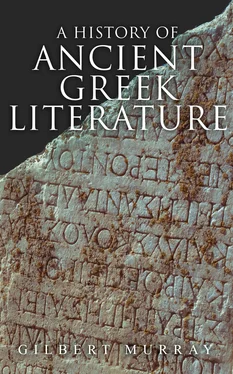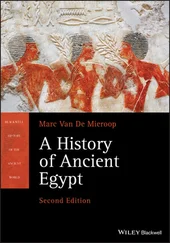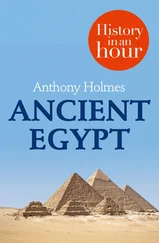The Erga is delightful in its descriptions of the seasons -- a subject that touched Greek feelings down to the days of Longus. Take the month of Lenaion, " bad days, enough to flay an ox, when the north wind rides down from Thrace, and earth and the plants shut themselves up; and he falls on the forest and brings down great oaks and pines; and all the wood groans, and the wild beasts shiver and put their tails between their legs. Their hides are thick with fur, but the cold blows through them, and through the bull's hide and the goat's thick hair; but it cannot blow through to the gentle little girl who sits in the cottage with her mother, " and so on. And how good the summer is, in which foolish people have made it a reproach against Hesiod's poetic sensitiveness that he liked to sit in the shadow of a rock and have a picnic with milk and wine and plenty of food.
The Theogony is an attempt, of course hopelessly inadequate, to give a connected account of the gods, their origins and relationships. Some of it is more than old; it is primeval. Several folk-gods occur whose names are found in Sanskrit, and who therefore may be imagined to date from Indo-European times, though they are too undignified for Homer to mention: Hestia, Rhea, Orthros, Kerberos. We are dealing with most ancient material in the Theogony; but the language, the present form of the poem, and perhaps the very idea of systematising the gods, are comparatively late. The Erga 702 is quoted by Semonides (about 650 B.C.). But it is impossible to date the poems. We have seen (p. 37 ) that the Theogony is quoted by the Iliad -- whereas the Theogony often quotes the Iliad and Odyssey, and at the end refers to the matter of several of the rejected epics. The text is in a bad condition; it is often hard to see the connection or the sense. It almost looks as if there were traces of a rhapsode's notes, which could be expanded in recitation. There are remains of real, not merely literary, religion. Erôs (120), Love, is prominent, because he was specially worshipped in Thespæ, Ascra's nearest big town. Hecatê has a hymn (411-452) SO earnest that it can only come from a local cult. A great part of the poem, the mutilation of Ouranos, the cannibalism of Cronos, only ceases to be repulsive when it is studied as a genuine bit of savage religion. To those of the later Greeks who took it more seriously, it was of course intolerable. There is real grandeur in the account of the Titan War, which doubtless would be intelligible if we had the Homeric Titan War * before us. And there is a great sea-feeling in the list of Nereids (347 ff.).
The Theogony ends ( 967-1020) with a list of the goddesses who lay in the arms of mortals and bore children like the gods. In the very last lines the poet turns from these -- " Now, sweet Muses, sing the race of mortal women. " Of course, the Muses did sing of them, but the song is lost. It is referred to in antiquity by various names -- ' The Catalogue of Women, ' ' The Poems about Women, ' ' The Lists of Heroic Women '; particular parts of it are quoted as ' The Eoiai, ' ' The Lists of the Daughters of Leukippos, ' ' of the Daughters of Proitos, ' and so on.
Why were lists of women written? For two reasons. The Locrians are said to have counted their genealogies by the woman's side; and if this, as it stands, is an exaggeration, there is good evidence, apart from Nossis and her fellow-poetesses, for the importance of women in Locris. Secondly, most royal houses in Greece were descended from a god. In the days of local quasimonotheistic religion this was simply managed: the local king came from the local god. But when geographical boundaries were broken down, and the number of known gods consequently increased, these genealogies had to be systematised, and sometimes amended. For instance, certain Thessalian kings were descended from Tyro and the river Enîpeus. This was well enough in their own valley; but when they came out into the world, they found there families descended from Poseidon, the god of the great sea, perhaps of all waters, and they could not remain content with a mere local river. In Odyssey λ we have the second stage of the story: the real ancestor was Poseidon, only he visited Tyro disguised as the river! The comparatively stable human ancestresses form the safest basis for cataloguing the shifting divine ancestors. There were five books in the Alexandrian edition of the Catalogues of Women, * the last two being what is called Eoiai. * This quaint title is a half-humorous plural of the expression ᾔ οι+’′η, ' Or like, ' . . . which was the form of transition to a new heroine, " Or like her who dwelt in Phthia, with the Charites' own loveliness, by the waters of Pênêus, Cyrene the fair. " There are one hundred and twenty-four fragments of the Catalogue * and twenty-six of the ' Or likes. '* If they sometimes contradict each other, that is natural enough, and it cannot be held that the Alexandrian five books had all the women there ever were in the Hesiodic lists. When once the formula ' Or like ' was started, it was as easy to put a new ancestress into the list as it is, say, to invent a new quatrain on the model of Edward Lear's. Further more, it was easy to expand a given Eoiê * into a story, and this is actually the genesis of our third Hesiodic poem, the Shield of Heracles , the ancestress being, of course, the hero's mother, Alcmênê.
The Shield begins: "Or like Alcmênê, when she fled her home and fatherland, and came to Thebes; " it goes on to the birth of Heracles, who, it proceeds to say, slew Kyknos, and then it tells how he slew Kyknos. In the arming of Heracles before the battle comes a long description of the shield.
There were rejected poems in Hesiod's case as well as in Homer's. The anonymous Naupactia, * a series of expanded genealogies, is the best known of them; but there were Hesiodic elements in some of the Argive and Corinthian collections attributed to 'Eumêlus.' His main rival rejoices in the fictitious name of Kerkêps ('Monkey-face') of Miletus. The Erga is Hesiod's Iliad, the only work unanimously left to him. The people of Helicon showed Pausanias, or his authority, a leaden tablet of the Erga without the introduction, and told him that nothing else was the true Hesiod. 6
The Bridal of Keyx, * about a prince of Trachis, who entertained Heracles, was probably also an expanded Eoiê 'very like the Shield; and the same perhaps holds of the Aigimios, * which seems to have narrated in two books the battle of that ancestor of the Dorians against the Lapithæ. The Descent to Hades * had Theseus for its hero. The Melampodia * was probably an account of divers celebrated seers. More interesting are the scanty remains of the Advices of Chiron * to his pupil Achilles. The wise Centaur recommended sacrificing to the gods whenever you come to a house, and thought that education should not begin till the age of seven.
The Erga was known in an expanded form, The Great Erga. * There were poems on Astronomy * and on Augury by Birds, * on a journey round the World,* and on the Idæan Dactyli, * who attended Zeus in Crete. The names help us to realise the great mass of poetry of the Bæotian school that was at one time in existence. As every heroic story tended to take shape in a poem, so did every piece of art or knowledge or ethical belief which stirred the national interest or the emotions of a particular poet.
ORPHEUS -- REVELATION AND MYSTICISM
In studying the social and the literary history of Greece, we are met by one striking contrast. The social history shows us the Greeks, as the Athenians thought themselves, 'especially god-fearing,' or, as St. Paul put it, 'too superstitious.' The literature as preserved is entirely secular. Homer and Hesiod mention the gods constantly; but Homer treats them as elements of romance, Hesiod treats them as facts to be catalogued. Where is the literature of religion, the literature which treated the gods as gods? It must have existed. The nation which had a shrine at every turn of its mountain paths, a religious ceremony for every act of daily life, spirits in every wood and river and spring, and heroes for every great deed or stirring idea, real or imagined; which sacrificed the defence of Thermopylæ rather than cut short a festival; whose most enlightened city at its most sceptical time allowed an army to be paralysed and lost because of an eclipse of the moon, and went crazy because the time-honoured indecencies of a number of statues were removed without authority -- that nation is not adequately represented by a purely secular literature. As a matter of fact, we can see that the religious writings were both early and multitudinous.
Читать дальше












